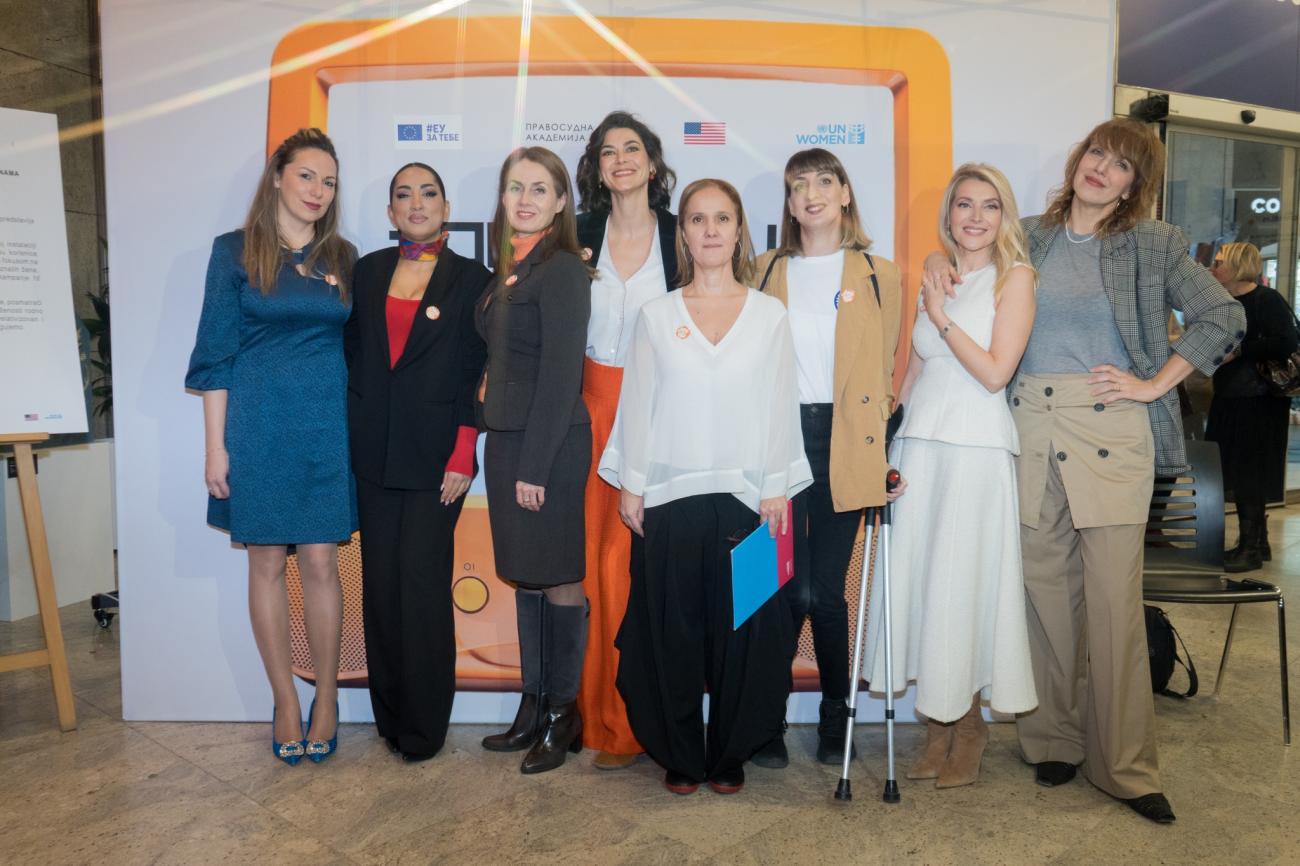Confronting Digital Violence in Serbia: The Urgent Call to #UnfollowViolence

In Serbia, 1 in 4 face violence. #UnfollowViolence tackles digital abuse, raising awareness and empowering victims to confront and overcome gender-based harm.
By unveiling the Digital Reality art installation, which displays the language of gender-based violence on large mirrors, reflecting the abuse that 20 well-known women on platform X have faced, Serbia has joined one of the world’s largest campaigns “16 Days of Activism Against Gender-Based Violence”. The campaign was launched at the event held in the EU House in Belgrade, organized by the United Nations Entity for Gender Equality and the Empowerment of Women (UN Women) in Serbia, with the support of the U.S. Embassy in Serbia, the EU Delegation, the Judicial Academy, the Ministry of Justice of the Republic of Serbia, the Commissioner for the Protection of Equality and civil society organizations.
The Digital Reality installation, created in collaboration with artist Iva Kuzmanovic, sheds light on the everyday reality of gender-based violence in the digital space, exposing the threats, insults, and degrading comments that social media users in Serbia face. It specifically focuses on the experiences of 20 prominent women from various professions on platform X, some of whom are also part of the 16 Days of Activism Against Gender-Based Violence campaign.
Through large mirrors that reflect the abusive messages, the installation puts viewers in a position of vulnerability, confronting them with the harsh impact of online hate speech. The aim is to emphasize that digital violence is not harmless or fleeting - it is real, serious, and must not be ignored. Alongside this, the #UnfollowViolence initiative aims to raise awareness of the growing prevalence of digital violence, particularly unsolicited messages and public shaming of girls and women on social media - now among the most widespread forms of online abuse.
"The findings of a recent UN Women study conducted in Serbia are deeply concerning; 84% of women and girls who have been exposed to offensive online content believe they are to blame for the humiliation they suffered. We must challenge toxic narratives, hold perpetrators accountable, and create online spaces that empower rather than endanger women and girls," stated Paul Jukic, Political Advisor at the U.S. Embassy in Serbia.
"The European Union upholds a zero-tolerance policy toward violence against women and girls, both online and offline. In today’s digital age, we remain committed to combating hate speech on social media and creating safe digital spaces for all women and girls," stated Plamena Halacheva, Deputy Head of the EU Delegation to Serbia.
"During the 16 Days of Activism campaign, we want to highlight that digital violence is very real, extremely serious, and leaves devastating consequences; often with no escape. We must all recognize that it is just as severe as any other form of violence and should be treated as such," stated Brankica Jankovic, Commissioner for Gender Equality.
"Victims of digital violence must be protected, empowered, and their cases must be resolved efficiently, with appropriate sanctions. This ensures that both victims and potential victims understand that they can seek justice and receive the protection they deserve," stated Nenad Vujic, Director of the Judicial Academy.
"In Serbia, one in four people is exposed to some form of violence, while globally, one in three girls under the age of 15 has experienced digital violence. Digital violence has harmful consequences and should be recognized as equally serious as any other form of violence," stated Milana Rikanovic, Head of the UN Women Office in Serbia.
As many as 84% of girls and women in Serbia believe they are personally responsible for the digital violence they have experienced, while 54% think that perpetrators are unaware of the consequences and perceive their actions as harmless and fleeting. These preliminary findings from the first national survey were presented as part of the #UnfollowViolence initiative.
Prominent voices also join the call to #UnfollowViolence:
"I am not to blame for existing, for being a woman, for being Roma, for being a singer, or for being beautiful. We all live these double lives—the real one and the cyber one. I have learned, in many ways, that I am not at fault and that I should not feel less worthy," said singer Zejna.
"None of us women who have experienced digital violence are to blame for someone else’s behavior. These are people who may live around us, shop at the same store, share the same building, or even the same home—without us even knowing it. That’s why, beyond all the appeals, I believe we must learn about the rights we have," said actress Anđelka Stević Žugić.
"I believe many of us are deeply intimidated and fear how we will be portrayed online—how our videos, posts, messages, and comments might be misused. My role today is to encourage women from vulnerable social groups to make their voices heard, to speak up, to delete harmful comments, and to avoid engaging in online conflicts," said activist Lana Nikolić.
"I have reported violence more than 20 times, both in real life and in the digital sphere, but I cannot say I have had positive experiences with the process. Unfortunately, institutions have not responded the way they should have," said activist Marija Lukić.
"Silence normalizes violence, and if we don’t want that, we must acknowledge that online violence happens every day and needs to be reported. It is difficult, which is why many don’t do it—but that is precisely one of the reasons violence persists," said writer and director Maja Uzelac.




